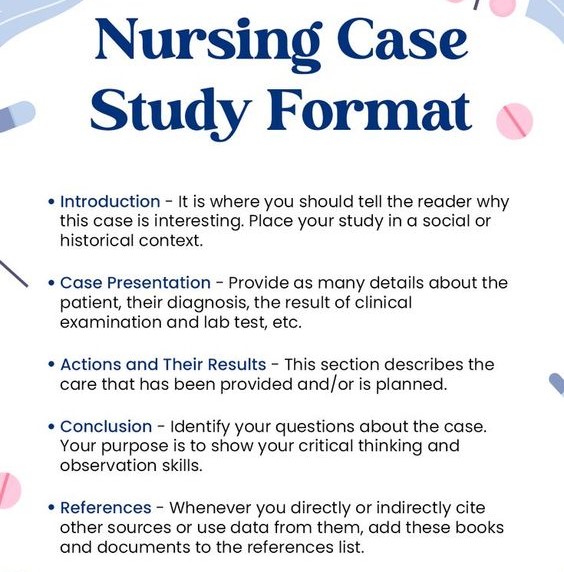
Table of Contents
Nursing case studies are more than just academic exercises; they are powerful tools for learning, reflection, and improvement. A good nursing case study provides a window into the complexities of patient care, allowing nurses to analyze situations, explore different perspectives, and refine their clinical decision-making skills. Writing a compelling and insightful case study requires a deep understanding of the process, from selecting the right case to crafting a comprehensive analysis.
This comprehensive guide will walk you through every step of the journey, equipping you with the knowledge and skills to create a truly impactful nursing case study.
Choosing The Right Case
The foundation of a successful nursing case study lies in the selection of a compelling and relevant case. Although students may pursue different approaches, the following considerations can get you closer to choosing the right case for your study.
- Clinical Significance: The case should illustrate a significant clinical issue, showcasing complex patient needs, unique challenges, or relevant interventions.
- Ethical Considerations: Ensure the case study does not violate patient privacy or confidentiality. Seek informed consent if necessary.
- Learning Objectives: Align the case with specific learning objectives. Does it address a gap in knowledge, demonstrate best practices, or explore ethical dilemmas?
- Complexity: Aim for a nursing case study that offers a balance between complexity and manageability. Avoid overly simple or overly complex scenarios.
Collecting Data for Your Case Study
Once you have selected a case to focus on, take time to gather comprehensive information to support your analysis. Various data collection methods can be applied but, you should narrow down the search to sources and actions relevant to the nursing career.
- Patient Chart Review: Carefully review the patient’s medical records, including demographics, medical history, medications, vital signs, laboratory tests, and diagnostic procedures.
- Direct Patient Interaction: If possible, interview the patient and their family members to gain insights into their experiences, preferences, and concerns.
- Collaboration with the Care Team: Speak with other healthcare professionals involved in the patient’s care, such as physicians, therapists, and social workers, to gather their perspectives and interventions.
- Literature Review: Research relevant medical literature to provide context and support your analysis. This includes evidence-based guidelines, research articles, and professional standards of care.
How to Structure a Nursing Case Study
A well-structured nursing case study provides a clear and logical flow of information. The following is the recommended structure that your case study should follow.

Introduction
- Background: Briefly introduce the case, providing context and establishing the relevance of the chosen patient scenario.
- Purpose: State the specific learning objectives or research questions the case study aims to address.
Patient Profile
- Demographics: Include relevant information about the patient, such as age, gender, occupation, and cultural background.
- Presenting Problem: Describe the primary reason for seeking medical attention.
- Medical History: Summarize past medical conditions, surgeries, allergies, and medications.
- Family History: Highlight significant family health history, especially relevant to the patient’s current condition.
- Social History: Briefly describe the patient’s social support system, living situation, and any relevant lifestyle factors.
Clinical Presentation
- Physical Assessment: Describe the patient’s physical examination findings, including vital signs, appearance, and any pertinent observations.
- Diagnostic Tests: Discuss the results of relevant laboratory tests, imaging studies, and other diagnostic procedures.
- Medical Diagnosis: Clearly state the patient’s confirmed medical diagnosis based on the collected data.
Nursing Assessment
- Subjective Data: Include patient statements, expressed concerns, and perceived needs.
- Objective Data: Present observable findings, measurements, and results of physical assessments.
- Nursing Diagnoses: Identify the patient’s nursing diagnoses based on the identified needs and health problems.
- Expected Outcomes: Set clear and measurable goals for the patient’s care, aligned with the nursing diagnoses.
Nursing Interventions
- Implementation: Describe the specific nursing interventions chosen to address the patient’s needs, including medication administration, wound care, patient education, and communication strategies.
- Rationales: Explain the rationale behind each intervention, citing evidence-based practices and supporting literature.
Evaluation
- Patient Response: Document the patient’s response to the interventions, both positive and negative.
- Outcome Analysis: Assess whether the interventions were successful in achieving the expected outcomes.
- Reflection: Discuss your personal reflection on the experience, including insights gained, limitations encountered, and areas for improvement.
Conclusion
- Summary: Recap the key findings of your nursing case study, highlighting significant learning points.
- Recommendations: Offer specific recommendations for future practice based on the analysis of the case.
- Ethical Implications: Explore any ethical considerations or dilemmas raised by your nursing case study.
Case Study Writing Style and Formatting
- Objectivity: Maintain a neutral and objective tone, avoiding personal opinions or biases.
- Clarity and Conciseness: Use clear and concise language, avoiding jargon or technical terms that may be unfamiliar to readers.
- Professionalism: Adhere to professional writing standards, including proper grammar, punctuation, and citation style.
- APA Style: Use APA style for referencing and formatting.
- Visual Aids: Utilize tables, graphs, and images to present data effectively and enhance readability.
Critical Thinking and Analysis
- Evidence-Based Practice: Base your analysis on current research and evidence-based guidelines.
- Critical Thinking: Apply critical thinking skills to analyze the case, identify assumptions, and draw logical conclusions.
- Ethical Considerations: Reflect on the ethical implications of the case and explore alternative approaches.
- Interprofessional Collaboration: Discuss the importance of effective communication and collaboration with other healthcare professionals.
- Patient-Centered Care: Focus on the patient’s perspective and emphasize the importance of individualized care.
Examples of Relevant Topics for Nursing Case Studies
- Patient Education and Empowerment: Cases showcasing successful strategies for patient education, health promotion, and self-management of chronic conditions.
- End-of-Life Care: Cases addressing complex ethical issues, symptom management, and compassionate care at the end of life.
- Critical Care Nursing: Cases exploring the management of complex medical conditions, critical interventions, and ethical considerations in intensive care settings.
- Mental Health Nursing: Cases addressing patient experiences with mental health disorders, therapeutic interventions, and challenges in managing mental health needs.
- Geriatric Nursing: Cases illustrating the care of older adults with multiple health conditions, including cognitive impairment, frailty, and end-of-life care.
Tips for Writing an Outstanding Nursing Case Study
- Start Early: Allow ample time for research, data collection, analysis and writing.
- Focus on One Key Issue: Choose a case that allows you to explore a specific nursing challenge or intervention in depth.
- Use Strong Verbs and Active Voice: Use strong verbs to create a dynamic and engaging narrative.
- Cite Sources Carefully: Use accurate citations to support your claims and ensure the credibility of your work.
- Seek Feedback: Share your case study with peers, instructors, or clinical mentors for feedback and suggestions for improvement.
The Bottom Line
Writing a nursing case study is a valuable opportunity for professional growth and knowledge sharing. By following the steps discussed above and incorporating critical thinking skills, you can create a compelling and insightful case study that showcases your clinical expertise and contributes to the advancement of nursing practice. However, the tasks could still be overwhelming to most students. And, that is why you also need professional help with writing nursing case studies to ensure success. PhDNurseWriter offers the best academic writing services for case studies, research papers, essays and dissertations.





